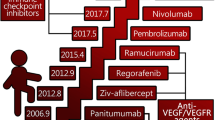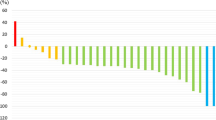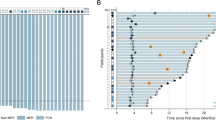Abstract
The management of colorectal cancer (CRC) has changed considerably in the past 15 years with the introduction of multiple novel active therapeutic agents. Chemotherapy regimens combining a fluoropyrimidine with either oxaliplatin or irinotecan are standard first-line and second-line therapy for advanced and metastatic disease. The first-line use of these combinations produces tumor response rates of ∼50% and a median overall survival of ∼20 months. Addition of bevacizumab to first-line treatment and addition of cetuximab to salvage therapy for patients who fail to respond to irinotecan have contributed to further increases in tumor response rates and enhanced progression-free survival. Such approaches have produced only marginal overall survival benefits, however, and entail considerable cost. Adjuvant chemotherapy, delivered after surgical resection of the primary tumor, increases cure rates by ∼10% for stage III disease and ∼3–4% for stage II disease. Encouraging reductions in local relapse rates have been observed in patients with early rectal cancer who have undergone chemoradiotherapy, and increasingly complex regimens are currently being explored in phase II clinical trials in an attempt to increase both the operability and long-term local control of CRC. The greater the therapeutic choice, the greater the cost (both financial and in terms of toxicity), thus the keener the clinical community becomes to develop biomarkers to select patient populations who will be most likely to benefit from a specific agent.
Key Points
-
Colorectal cancer is a common disease with approximately 1 million new cases diagnosed each year
-
Chemotherapy for advanced disease can palliate symptoms and extend life by 12–18 months
-
Chemotherapy for early disease has increased cure rates by approximately 3–10%, depending on the stage of disease
-
Novel biologic therapies have had modest effect on colorectal cancer outcomes when applied to whole populations
-
In the future, patient selection for therapy on the basis of biological criteria is likely to improve response rates and decrease the toxic effects of therapeutic regimens
This is a preview of subscription content, access via your institution
Access options
Subscribe to this journal
Receive 12 print issues and online access
$209.00 per year
only $17.42 per issue
Buy this article
- Purchase on Springer Link
- Instant access to full article PDF
Prices may be subject to local taxes which are calculated during checkout


Similar content being viewed by others
References
Midgley R and Kerr D (1999) Seminar on colorectal cancer. Lancet 353: 391–399
Cunningham D et al. (1998) Randomised trial of irinotecan plus supportive care versus supportive care alone after fluorouracil failure for patients with metastatic colorectal cancer. Lancet 352: 1413–1418
Douillard JY et al. (2000) Irinotecan combined with fluorouracil compared with fluorouracil alone as first-line treatment for metastatic colorectal cancer: a multicentre randomised trial. Lancet 355: 1041–1047
Saltz LB et al. for the Irinotecan Study Group (2000) Irinotecan plus fluorouracil and leucovorin for metastatic colorectal cancer. N Engl J Med 343: 905–914
Raumond E (1998) Oxaliplatin: mechanism of action and antineoplastic activity. Semin Oncol 25: 4–12
Raumond E et al. (1997) Antitumor activity of oxaliplatin in combination with 5-fluorouracil and the thymidylate synthase inhibitor AG337 in human colon, breast and ovarian cancers. Anticancer Drugs 8: 876–885
Rothenberg ML et al. (2003) Superiority of oxaliplatin and fluorouracil-leucovorin compared with either therapy alone in patients with progressive colorectal cancer after irinotecan and fluorouracil-leucovorin: interim results of a phase III trial. J Clin Oncol 21: 2059–2069
de Gramont A et al. (2000) Leucovorin and fluorouracil with or without oxaliplatin as first-line treatment in advanced colorectal cancer. J Clin Oncol 18: 2938–2947
Giacchetti I et al. (2000) Phase III multicenter randomized trial of oxaliplatin added to chronomodulated fluorouracil–leucovorin as first-line treatment of metastatic colorectal cancer. J Clin Oncol 18: 136–147
Goldberg RM et al. (2004) A randomized controlled trial of fluorouracil plus leucovorin, irinotecan, and oxaliplatin combinations in patients with previously untreated metastatic colorectal cancer. J Clin Oncol 22: 23–30
Grothey A et al. (2004) Survival of patients with advanced colorectal cancer improves with the availability of fluorouracil-leucovorin, irinotecan and oxaliplatin in the course of treatment. J Clin Oncol 22: 1209–1214
Taron M et al. (1999) Preclinical synergy of oxaliplatin (OXA), topoisomerase I-inhibitor (topotecan) and 5-fluorouracil in sensitive and 5-fluorouracil resistant HT29 cell line [abstract #651]. In Proceedings of the 35th ASCO Annual Meeting: 1999 May 15–18; Atlanta, GA. ASCO: Alexandria, VA
Seymour MT et al. (2007) Different strategies of sequential and combination chemotherapy for patients with poor prognosis advanced colorectal cancer (MRC FOCUS): a randomised controlled trial. Lancet 370: 143–152
Koopman M et al. (2007) Sequential versus combination chemotherapy with capecitabine, irinotecan and oxaliplatin in advanced colorectal cancer (CAIRO): a phase III randomised controlled trial. Lancet 370: 135–142
Falcone A et al. (2007) Phase III trial of infusional fluorouracil, leucovorin, oxaliplatin, and irinotecan (FOLFOXIRI) compared with infusional fluorouracil, leucovorin, and irinotecan (FOLFIRI) as first-line treatment for metastatic colorectal cancer: the Gruppo Oncologico Nord Ovest. J Clin Oncol 25: 1670–1676
Miwa M et al. (1998) Design of a novel oral fluoropyrimidine carbamate, capecitabine, which generates 5-fluorouracil selectively in tumours by enzymes concentrated in human liver and cancer tissue. Eur J Cancer 34: 1274–1281
Van Cutsem E et al. (2001) Oral capecitabine compared with intravenous fluorouracil plus leucovorin in patients with metastatic colorectal cancer: results of a large phase III study. J Clin Oncol 19: 4097–4106
Hoff PM et al. (2001) Comparison of oral capecitabine versus intravenous fluorouracil plus leucovorin as first-line treatment in 605 patients with metastatic colorectal cancer: results of a randomized phase III study. J Clin Oncol 19: 2282–2292
Twelves C et al. (2005) Capecitabine as adjuvant treatment for stage III colon cancer. N Engl J Med 352: 2696–2704
Fuchs CS et al. (2007) Randomized, controlled trial of irinotecan plus infusional, bolus, or oral fluoropyrimidines in first-line treatment of metastatic colorectal cancer: results from the BICC-C study. J Clin Oncol 25: 4779–4786
Kohne CH et al. (2008) Irinotecan combined with infusional 5-fluorouracil/folinic acid or capecitabine plus celecoxib or placebo in the first-line treatment of patients with metastatic colorectal cancer. EORTC study 40015. Ann Oncol 19: 920–926
Cassidy J et al. (2006) Randomized phase III study of capecitabine plus oxaliplatin compared with fluorouracil/folinic acid plus oxaliplatin as first-line therapy for metastatic colorectal cancer. J Clin Oncol 26: 2012–2008
Midgley RS and Kerr DJ (2008) Capecitabine: have we got the dose right. Nat Clin Pract Oncol [10.1038/ncponc1240]
Maughan TS et al. (2003) Comparison of intermittent and continuous palliative chemotherapy for advanced colorectal: a multicentre randomized trial. Lancet 361: 457–464
Tournigand C et al. (2006) OPTIMOX1: a randomized study of FOLFOX4 or FOLFOX7 with oxaliplatin in a stop-and-go fashion in advanced colorectal cancer—a GERCOR study. J Clin Oncol 24: 394–400
Andre T et al. (2007) Phase II study of an optimized 5-fluorouracil-oxaliplatin strategy (OPTIMOX2) with celecoxib in metastatic colorectal cancer: a GERCOR study. Ann Oncol 8: 77–81
Labianca R et al. (2006) Alternating versus continuous “FOLFIRI” in advanced colorectal cancer (ACC): a randomized “GISCAD” trial [abstract #3505]. In Proceedings of the 42nd ASCO Annual Meeting: 2006. June 2–6; Atlanta, GA. ASCO: Alexandria, VA
Ferrara N (2003) The biology of VEGF and its receptors. Nat Med 9: 669–676
Hurwitz H et al. (2004) Bevacizumab plus irinotecan, fluorouracil, and leucovorin for metastatic colorectal cancer. N Engl J Med 350: 2335–2342
Saltz LB et al. (2008) Bevacizumab in combination with oxaliplatin-based chemotherapy as first-line therapy in metastatic colorectal cancer: a randomised phase III study. J Clin Oncol 26: 2013–2019
Mayer A (1993) The prognostics significance of proliferating cell nuclear antigen, epidermal growth factor receptor, and mdr gene expression in colorectal cancer. Cancer 71: 2454–2460
Hemming AW (1992) Prognostic markers of colorectal cancer: an evaluation of DNA content, epidermal growth factor receptor, and ki-67. J Surg Oncol 51: 147–152
Saltz LB et al. (2004) Phase II trial of cetuximab in patients with refractory colorectal cancer that expresses the epidermal growth factor receptor. J Clin Oncol 22: 1201–1208
Cunningham D et al. (2004) Cetuximab monotherapy and cetuximab plus irinotecan in irinotecan-refractory metastatic colorectal cancer. N Engl J Med 351: 337–345
Van Cutsem E et al. (2007) Randomized phase III study of irinotecan and 5-FU/FA with or without cetuximab in the first-line treatment of patients with metastatic colorectal cancer (mCRC): the CRYSTAL trial [abstract #4000]. In Proceedings of the 43rd ASCO Annual Meeting: 2007 June 1–5; Chicago, IL. ASCO: Alexandria, VA
Bokemeyer C et al. (2007) Cetuximab plus 5-FU/FA/oxaliplatin (FOLFOX-4) versus FOLFOX-4 in the first-line treatment of metastatic colorectal cancer (mCRC): OPUS, a randomized phase II study [abstract #4035]. In Proceedings of the 43rd ASCO Annual Meeting: 2007. June 1–5; Chicago, IL. ASCO: Alexandria, VA
Van Cutsem et al. (2008) KRAS status and efficacy in the first-line treatment of patients with metastatic colorectal cancer (mCRC) treated with FOLFIRI with or without cetuximab: the CRYSTAL experience [abstract #2]. In Proceedings of the 44th ASCO Annual Meeting: 2008. May 30–June 3; Chicago, IL. ASCO: Alexandria, VA
Bokemeyer C et al. (2008) KRAS status and efficacy of first-line treatment of patients with metastatic colorectal cancer (mCRC) with FOLFOX with or without cetuximab: the OPUS experience [abstract #4000]. In Proceedings of the 44th ASCO Annual Meeting: 2008 May 30–June 3; Chicago, IL. ASCO: Alexandria, VA
National Institute of Clinical Excellence [http://www.nice.org.uk]
Gray RG et al. on behalf of the QUASAR Collaborative Group (2000) Comparison of fluorouracil with additional levamisole, higher-dose folinic acid, or both, as adjuvant chemotherapy for colorectal cancer: a randomised trial. Lancet 355: 1588–1596
Saltz LB et al. (2007) Irinotecan fluorouracil plus leucovorin is not superior to fluorouracil plus leucovorin alone as adjuvant treatment for stage III colon cancer: results of CALGB 89803. J Clin Oncol 25: 3456–3461
Van Cutsem E et al. (2005) Randomized phase III trial comparing infused irinotecan / 5-fluorouracil (5-FU) / folinic acid (IF) versus 5-FU/FA (F) in stage III colon cancer patients (PETACC 3) [abstract #8]. In Proceedings of the 41st ASCO Annual Meeting: 2005 May 13–17; Orlando, FL. ASCO: Alexandria, VA
André T et al. (2004) Oxaliplatin, fluorouracil, and leucovorin as adjuvant treatment for colon cancer. N Engl J Med 350: 2343–2351
Kuebler JP et al. (2007) Oxaliplatin combined with weekly bolus fluorouracil and leucovorin as surgical adjuvant chemotherapy for stage II and III colon cancer: results from NSABP C-07. J Clin Oncol 25: 198–204
QUASAR Collaborative Group (2007) Adjuvant chemotherapy versus observation in patients with colorectal cancer: a randomised study. Lancet 370: 2020–2029
Camma C et al. (2000) Pre-operative radiotherapy for resectable rectal cancer: a meta-analysis. JAMA 284: 1008–1015
Gérard J-P et al. (2006) Preoperative radiotherapy with or without concurrent fluorouracil and leucovorin in T3-4 rectal cancers: results of FFCD 9203. J Clin Oncol 24: 4620–4625
Bosset J-F et al. (2006) Chemotherapy with preoperative radiotherapy in rectal cancer. N Engl J Med 355: 1114–1123
Braendengen et al. (2008) Randomized phase III study comparing preoperative radiotherapy with chemoradiotherapy in nonresectable rectal cancer. J Clin Oncol 26: 3687–3694
Rödel C et al. (2007) Multicenter phase ii trial of chemoradiation with oxaliplatin for rectal cancer. J Clin Oncol 25: 110–117
Iacopetta B et al. (2006) Functional categories of TP53 mutation in colorectal cancer: results of an International Collaborative study. Ann Oncol 17: 842–847
Shankaran V et al. (2008) The role of molecular markers in predicting response to therapy in patients with colorectal cancer. Mol Diagn Ther 12: 87–98
Baeten CI et al. (2006) Proliferating endothelial cells and leukocyte infiltration as prognostic markers in colorectal cancer. Clin Gastroenterol Hepatol 4: 1351–1357
Aschele C et al. (1999) Immunohistochemical quantitation of thymidylate synthase expression in colorectal cancer metastases predicts for clinical outcome to fluorouracil-based chemotherapy. J Clin Oncol 17: 1760–1770
Salonga D et al. (2000) Colorectal tumors responding to 5-fluorouracil have low gene expression levels of dihydropyrimidine dehydrogenase, thymidylate synthase, and thymidine phosphorylase. Clin Cancer Res 6: 1322–1327
Yamada H et al. (2008) Prognostic value of 5-fluorouracil metabolic enzyme genes in Dukes' stage B and C colorectal cancer patients treated with oral 5-fluorouracil-based adjuvant chemotherapy. Oncol Rep 19: 729–735
Author information
Authors and Affiliations
Corresponding author
Ethics declarations
Competing interests
The authors declare no competing financial interests.
Rights and permissions
About this article
Cite this article
Midgley, R., Yanagisawa, Y. & Kerr, D. Evolution of nonsurgical therapy for colorectal cancer. Nat Rev Gastroenterol Hepatol 6, 108–120 (2009). https://doi.org/10.1038/ncpgasthep1337
Received:
Accepted:
Published:
Issue Date:
DOI: https://doi.org/10.1038/ncpgasthep1337
This article is cited by
-
Comparison of Capecitabine (Xeloda) vs. Combination of Capecitabine and Oxaliplatin (XELOX) as Neoadjuvant CRT for Locally Advanced Rectal Cancer
Pathology & Oncology Research (2019)
-
Integration of conventional cell viability assays for reliable and reproducible read-outs: experimental evidence
BMC Research Notes (2018)
-
Genetic prognostic and predictive markers in colorectal cancer
Nature Reviews Cancer (2009)



